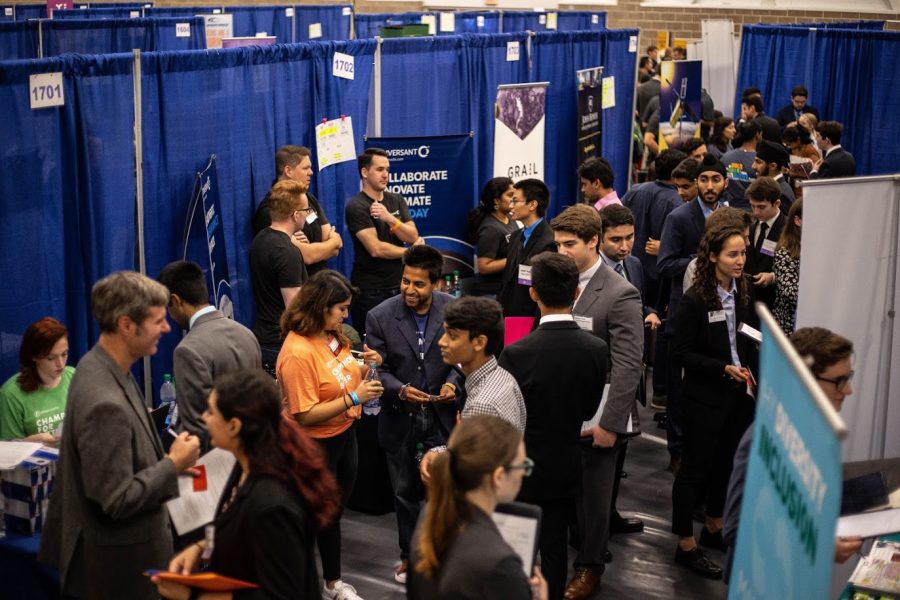Engineering students hindered by COVID-19
Illinois Engineering students speak with potential employers at the Engineering Career Fair at the ARC on Sept. 11, 2018. This year, the fair is online rather than in person.
Nov 5, 2020
The University of Illinois is ranked 10th in the country for its engineering program with over 20% of all its student body in the College of Engineering as of fall 2019. For this year’s incoming class, college was meant to be a new experience just like it was for all the students before. As of spring 2020, though, all their plans were altered drastically with the COVID-19 pandemic bringing the world to a standstill.
Most engineering courses — ranging from the most basic classes like PHYS 211: University Physics Mechanics and CHEM 102: General Chemistry I to some of the most specific and advanced courses like ME 370 Mechanical Design I and ECE 391: Computer Systems Engineering — require students to take a lab section along with the lecture to promote a more hands-on and practical approach to the topic of study.
For Sejal Karwa, sophomore in Engineering, returning to campus for the fall 2020 semester was greatly dependent on the courses that required her to take labs. However, due to the University’s hybrid approach to classes this semester, her learning and comfort with the classes were greatly affected.
“For organic chemistry, which is a course I’m required to take for my major. The (teachers’s assistants) and professor have a hard time guiding us through mechanisms since we aren’t able to draw them out right in front of them in real-time,” Karwa said.
Karwa said even for her physics course, which is also required for her major, her and her group members weren’t able to conduct the lab experiments in person, which made it significantly harder to comprehensively understand how to properly perform the experiment, as every team member performs it individually.
Get The Daily Illini in your inbox!
“A lot of my friends, who I would normally have courses with, didn’t return to campus, so even working with friends for a particular class has become harder,” Karwa said.
Karwa, who often visited her TAs during office hours the semester before, said the virtual office hours proved to be of little help as not being there in person limited her ability to understand certain concepts.
“Virtual classes feel like they’re optional, but they really aren’t, which is a huge problem, because you just procrastinate everything more,” Karwa said.
The Engineering Career Fair, which is usually held in the fall semester every year with a smaller event during the spring semester, is often a stressful time for students. This event presented its own unique challenges. Students typically rush around all week in preparation, getting their outfits in line, perfecting their resumes and elevator pitches and learning how to talk to recruiters in hopes of landing an internship over the summer.
With in-person events canceled for the most part, the career fair moved to an online platform, changing the experience for Karwa.
This year’s career fair was virtual and primarily conducted through text on a platform called CareerEco. Students would chat with recruiters at different virtual booths, and if the recruiter wanted to talk more, they would initiate a video call.
“I’m nervous and stutter a lot when talking to recruiters, so texting them instead of talking made it easier for me,” she said.
She said she managed to turn quite a few conversations into video calls, which, although stressful, proved to be a learning experience as she had a much better grasp of talking to recruiters.
While Karwa didn’t manage to secure an internship for summer yet, she said she remains hopeful the spring career fair, to be held virtually in mid-February, will bring more opportunities.
“Academics have been challenging on their own this semester,” she said. “But since so few of my friends came back, I’ve gotten very close to the few that did, which is a bright side to all of this.”






